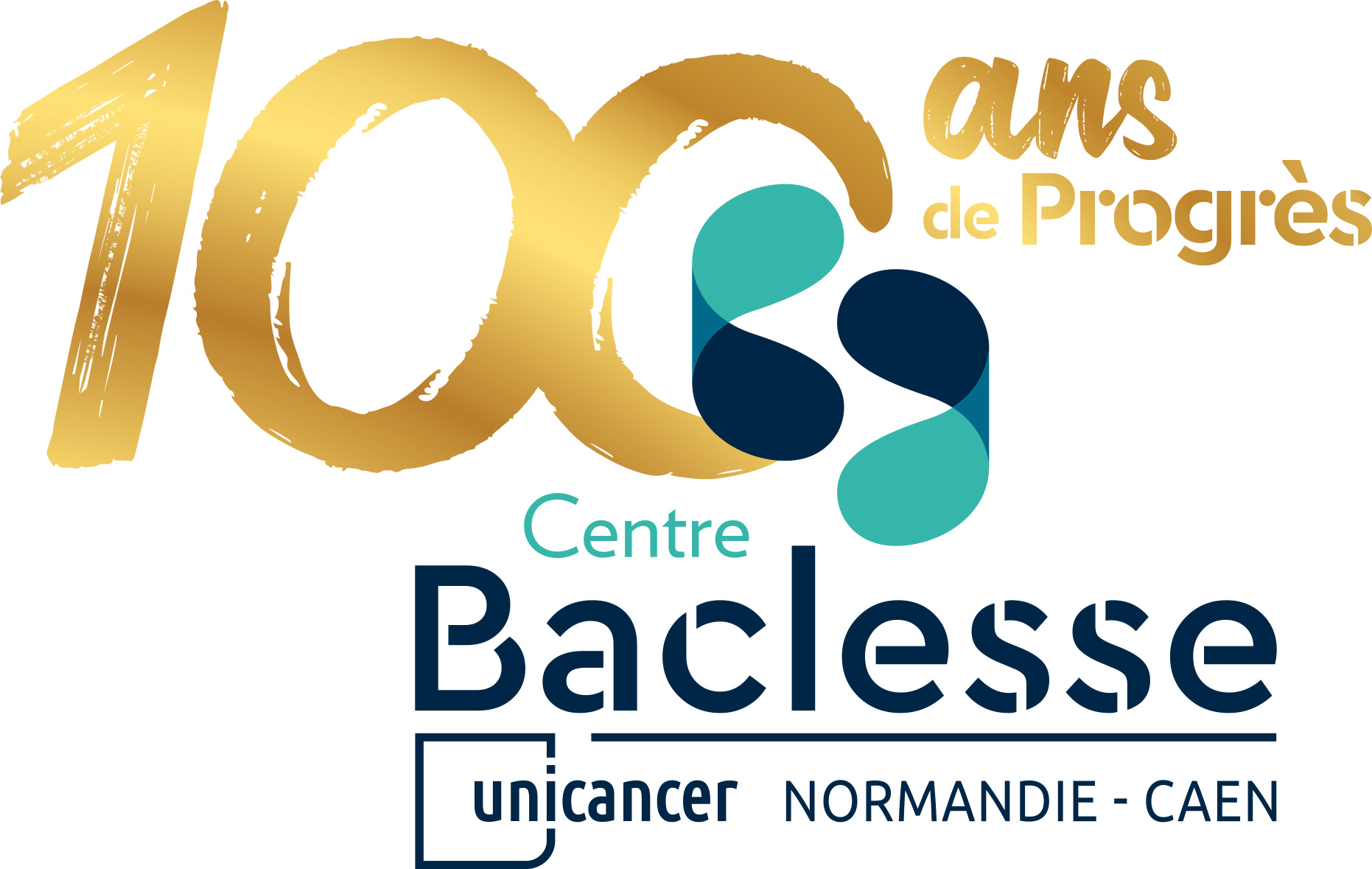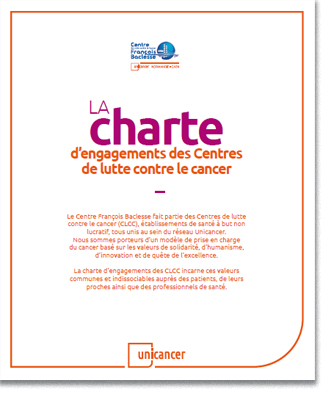A comprehensive cancer centre
The Centre François Baclesse is one of France’s 18 cancer centres and a member of the Unicancer network. Located in Caen, in Normandy, the Centre is a reference healthcare facility for cancer care, at regional, national and international level.
The Centre François Baclesse is a non-profit ‘private healthcare establishment of collective interest’ (ESPIC). As a stakeholder in public hospital care, the Centre François Baclesse does not apply private sector or excess fees – only statutory fees. Of public interest, it can receive donations and legacies, exempt from taxation.
The Centre is part of the Unicancer network, reuniting the 18 cancer centres throughout France.
The Centre François Baclesse’s public health mission is threefold: healthcare, research and education in the exclusive field of oncology.
The Centre François Baclesse is managed and administered by Prof. Roman Rouzier, who is seconded by Michael Canovas, deputy CEO.
Employing a total of 1,162 professionals, the Centre cares, every year, for around 27,500 patients and hosts over 600 students studying in medical and paramedical courses.
Our strengths
The Centre boasts a high-technology technical platform that is renowned at national and European level and offers patients access to a top quality healthcare offer throughout their care path.
Well established within the region, constantly striving to reinforce its links with external private practitioners and to remain faithful to its mission as a reference establishment at the cutting edge of innovation, Baclesse is, since 2018, the third French Centre authorised to conduct activities in proton therapy. The Centre’s researchers contribute towards research work by Inserm-certified associated research teams.
- Innovative technical platforms: radiotherapy, proton therapy, diagnostic and interventional radiology, nuclear medicine, operating theatre, cancer biology and genetics, anatomopathology.
- Innovative healthcare: fast care paths, anticipated chemotherapy preparation, personalised care based on biological profiles and healthcare paths, etc.
- A vast supportive care offer, to benefit patient quality of life
- A clinical research unit to monitor patients included in clinical trials and a certified early phase unit offering the opportunity to take part in the development of new molecules.
Our values
The Centre François Baclesse places the values of the Unicancer network at the heart of its commitments:
| Humanism | Innovation | Excellence | Solidarity |
|---|
Commitment charter
The Centre François Baclesse is committed to its patients and to their close circle via a 6-theme charter that is common to all Unicancer Cancer Centres:
Commitment No.1
To offer you the best treatment possible, adapted to your specific type of cancer, at the forefront of medical knowledge, and advances in research and technology.
Commitment No.2
To clearly inform you, listen to you and involve you in decisions that concern you.
Commitment No.3
To accompany you in the coordination of the care that is dispensed to you both inside and outside our hospital.
Commitment No.4
To help you and your family circle to maintain the best possible quality of life during your hospitalisation and in your home.
Commitment No.5
To encourage action in prevention and screening, in order to reduce your risk of developing cancer or to diagnose it as early as possible.
Commitment No.6
To guarantee you access to all care modalities, independently of your income and applying no excess fee.
Labels and certifications
- The Centre has been certified A by the HAS (French National Authority for Health) – this is the highest level of certification.
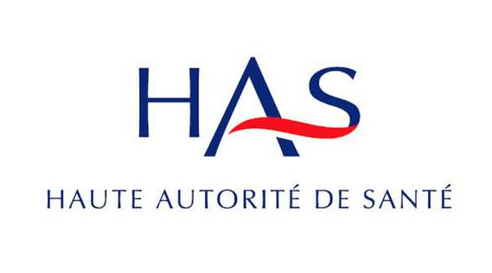
- It has been certified Early Phase Clinical Trial Centre (CLIP2) by the French National Cancer Institute (INCa).
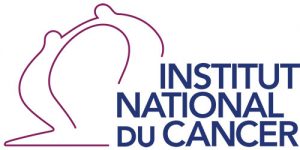
- The Centre François Baclesse is an accredited ‘Comprehensive Cancer Centre’ by the Organisation of European Cancer Institutes (OECI).
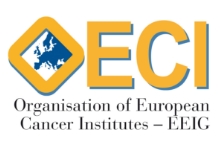
Institutional documents
Activity Report
- Activity Report 2023 (in french)
Summarised presentations
- Centre presentation flyer (in french)
Welcome booklets
Training
- Catalogue of continuing education programmes & professional development programmes in oncology for 2024 (in french)
2019-2022 Hospital Establishment Project
(in french)
Sustainable development
Our sustainable development approach
Through its vocation, its missions and activities, it is the Centre François Baclesse’s responsibility and duty to implement an exemplary sustainable development strategy.
For several years now, the Centre has been deploying action and efforts aimed at improving its operational efficiency, whilst limiting the impact of its activities on the environment and developing its societal responsibility. Hence, the Centre is committed to deploying a sustainable development policy that pays due consideration to environmental, economic and social dimensions.
This concerted effort is an integral part of the establishment’s overall strategy, and of the Unicancer network’s sustainable development policy. The Centre François Baclesse’s Sustainable Development Committee is in charge of coordinating and evaluating the associated action plan.
Such organisation guarantees that the principles of sustainable development are taken into account in all the establishment’s projects.
With this strategy in mind, the establishment’s commitments can be divided into 10 priority themes:
- Theme 1: To reinforce and formalise sustainable development management.
- Theme 2: To develop eco-responsible purchashing.
- Theme 3: To integrate environmental quality criteria in construction and renovation operations.
- Theme 4: To control and reduce water and energy consumption within the establishment.
- Theme 5: To optimise waste sorting, to reduce waste production and to promote recycling.
- Theme 6: To reduce transport-related carbon pollution by encouraging eco-friendly transport modes.
- Theme 7: To improve quality of life at work.
- Theme 8: To pursue the implementation of action in disease prevention and the promotion of good health.
- Theme 9: To facilitate external relations and the establishment’s integration within society.
- Theme 10: To increase awareness of sustainable development among professionals and users.
As per HAS (French National Authority for Health) recommendations, this policy is deployed via annual priority objectives and is covered by an action plan and indicator monitoring.
History
Dr François Baclesse, a pioneer
Le Centre bears the name of Dr François Baclesse. Who was he?
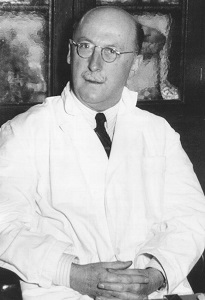
Born on 26 April 1896 in the Grand Duchy of Luxembourg, François Baclesse studied medicine in Paris, where he passed his internship exam in 1920. Paying a particular interest in the use of ionising radiation in medicine, he studied under Marie Curie and Claudius Regaud at the Institur du Radium in Paris. François Baclesse is one of the founding fathers of modern clinical radiotherapy. His internationally acclaimed publications focused, in particular, on cancers of the breast, larynx and uterus and on bone sarcoma. He passed away on 11 November 1967.
Successive CEOs
- Prof. Osmont: from 1931 to 1947
- Dr Gosselin: from 1947 to 1951
- Dr P. Jacob: from 1951 to 1967
- Prof. J. Lemenager: interim director from 1968 to 1970
- Prof. Jacques Séverin Abbatucci: from 1970 to 1988
- Dr Jean Robillard: from 1988 to 1991
- Prof. Jean-François Héron: from 1992 to 2007
- Prof. Jacques Monconduit: interim director in 2007
- Prof. Khaled Meflah: from 2008 to 2018
- Prof. Marc-André Mahé: since 2 July 2018 to 30 June 2023
- Prof. Roman Rouzier : from 1 July 2023
Key dates
| 1925 | The Centre Anticancéreux de Caen – CAC (Caen Anticancer Centre) was created on 5 September 1925. At the time, it was a specialised department of the regional hospital in Caen, housed in ‘Pavilion 2’ at the CHR site. |
| 1945 | The order signed on 1 October 1945 by General de Gaulle set the formal bases of the creation of French Cancer Centres (Centres de Lutte Contre le Cancer – CLCC): o Private non-profit establishments o Contributing towards public service in hospitals o Eligible to receive donations and legacies to fund their research and development. |
| 1947 | An official ministerial decree issued on 3 October 1947, acknowledged the CLCC in Caen with a legal personality. Its missions were: prevention, screening, cancer treatment, together with research and education. During the same period, the French Health Ministry afforded the centre regional coverage, including the departments of Calvados, Manche, Orne and Eure. External consultations by the Centre’s physicians were set up in Cherbourg, Saint-Lô, Saint-Hilaire du Harcouët, Alençon and Evreux. |
| 1952 | In a state of disrepair after the Second World War, the ‘Pavilion 2’ was renovated. It comprised 50 beds, divided over 10 rooms. At the time, 203 patients were treated using standard radiotherapy equipment. |
| 1960 | Inauguration of the external beam cobaltherapy and radio-isotope departments. The cobalt bomb was temporarily installed in the former underground icehouse in the St Louis park. Its structure, composed of a thick earthen shell, was perfectly suited to the necessary airtightness required for radioprotection purposes. At the time, dosimetry was performed manually and required 3 hours of preparation for each patient. The very first multidisciplinary groups, referred to as ‘medical committees’ were progressively implemented to discuss the treatment to be proposed to each patient. In the late 1960s, the Centre’s activity was such that extensive deliberation on its future led to the decision to build a new facility. |
| 1970 | The new Centre de Lutte Contre le Cancer, built within the hospital zone from 1970 to 1973, was inaugurated on 22 Feburary 1975, in the presence of Simone Veil, French Minister for Health. The new Centre was named, ‘Centre François Baclesse’, in homage to one of the forefathers of modern radiotherapy. |
The Unicancer network
Unicancer is the only French hospital network that is 100% devoted to the fight against cancer.
It reunites:
- 18 Cancer Centres (CLCC), private non-profit healthcare establishments, and 2 affiliates members, over 21 hospital sites
- 23,000 professionals involved in the fight against cancer on a daily basis.
